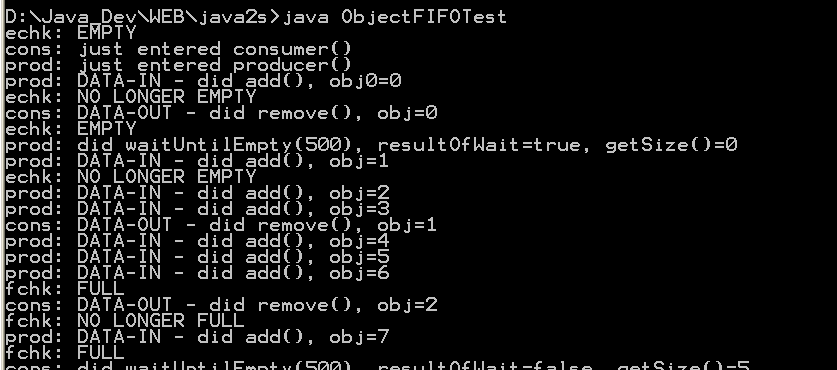Object FIFO

public class ObjectFIFOTest extends Object {
private static void fullCheck(ObjectFIFO fifo) {
try {
// Sync'd to allow messages to print while
// condition is still true.
synchronized (fifo) {
while (true) {
fifo.waitUntilFull();
print("FULL");
fifo.waitWhileFull();
print("NO LONGER FULL");
}
}
} catch (InterruptedException ix) {
return;
}
}
private static void emptyCheck(ObjectFIFO fifo) {
try {
// Sync'd to allow messages to print while
// condition is still true.
synchronized (fifo) {
while (true) {
fifo.waitUntilEmpty();
print("EMPTY");
fifo.waitWhileEmpty();
print("NO LONGER EMPTY");
}
}
} catch (InterruptedException ix) {
return;
}
}
private static void consumer(ObjectFIFO fifo) {
try {
print("just entered consumer()");
for (int i = 0; i < 3; i++) {
synchronized (fifo) {
Object obj = fifo.remove();
print("DATA-OUT - did remove(), obj=" + obj);
}
Thread.sleep(3000);
}
synchronized (fifo) {
boolean resultOfWait = fifo.waitUntilEmpty(500);
print("did waitUntilEmpty(500), resultOfWait=" + resultOfWait
+ ", getSize()=" + fifo.getSize());
}
for (int i = 0; i < 3; i++) {
synchronized (fifo) {
Object[] list = fifo.removeAll();
print("did removeAll(), list.length=" + list.length);
for (int j = 0; j < list.length; j++) {
print("DATA-OUT - list[" + j + "]=" + list[j]);
}
}
Thread.sleep(100);
}
for (int i = 0; i < 3; i++) {
synchronized (fifo) {
Object[] list = fifo.removeAtLeastOne();
print("did removeAtLeastOne(), list.length=" + list.length);
for (int j = 0; j < list.length; j++) {
print("DATA-OUT - list[" + j + "]=" + list[j]);
}
}
Thread.sleep(1000);
}
while (!fifo.isEmpty()) {
synchronized (fifo) {
Object obj = fifo.remove();
print("DATA-OUT - did remove(), obj=" + obj);
}
Thread.sleep(1000);
}
print("leaving consumer()");
} catch (InterruptedException ix) {
return;
}
}
private static void producer(ObjectFIFO fifo) {
try {
print("just entered producer()");
int count = 0;
Object obj0 = new Integer(count);
count++;
synchronized (fifo) {
fifo.add(obj0);
print("DATA-IN - did add(), obj0=" + obj0);
boolean resultOfWait = fifo.waitUntilEmpty(500);
print("did waitUntilEmpty(500), resultOfWait=" + resultOfWait
+ ", getSize()=" + fifo.getSize());
}
for (int i = 0; i < 10; i++) {
Object obj = new Integer(count);
count++;
synchronized (fifo) {
fifo.add(obj);
print("DATA-IN - did add(), obj=" + obj);
}
Thread.sleep(1000);
}
Thread.sleep(2000);
Object obj = new Integer(count);
count++;
synchronized (fifo) {
fifo.add(obj);
print("DATA-IN - did add(), obj=" + obj);
}
Thread.sleep(500);
Integer[] list1 = new Integer[3];
for (int i = 0; i < list1.length; i++) {
list1[i] = new Integer(count);
count++;
}
synchronized (fifo) {
fifo.addEach(list1);
print("did addEach(), list1.length=" + list1.length);
}
Integer[] list2 = new Integer[8];
for (int i = 0; i < list2.length; i++) {
list2[i] = new Integer(count);
count++;
}
synchronized (fifo) {
fifo.addEach(list2);
print("did addEach(), list2.length=" + list2.length);
}
synchronized (fifo) {
fifo.waitUntilEmpty();
print("fifo.isEmpty()=" + fifo.isEmpty());
}
print("leaving producer()");
} catch (InterruptedException ix) {
return;
}
}
private static synchronized void print(String msg) {
System.out.println(Thread.currentThread().getName() + ": " + msg);
}
public static void main(String[] args) {
final ObjectFIFO fifo = new ObjectFIFO(5);
Runnable fullCheckRunnable = new Runnable() {
public void run() {
fullCheck(fifo);
}
};
Thread fullCheckThread = new Thread(fullCheckRunnable, "fchk");
fullCheckThread.setPriority(9);
fullCheckThread.setDaemon(true); // die automatically
fullCheckThread.start();
Runnable emptyCheckRunnable = new Runnable() {
public void run() {
emptyCheck(fifo);
}
};
Thread emptyCheckThread = new Thread(emptyCheckRunnable, "echk");
emptyCheckThread.setPriority(8);
emptyCheckThread.setDaemon(true); // die automatically
emptyCheckThread.start();
Runnable consumerRunnable = new Runnable() {
public void run() {
consumer(fifo);
}
};
Thread consumerThread = new Thread(consumerRunnable, "cons");
consumerThread.setPriority(7);
consumerThread.start();
Runnable producerRunnable = new Runnable() {
public void run() {
producer(fifo);
}
};
Thread producerThread = new Thread(producerRunnable, "prod");
producerThread.setPriority(6);
producerThread.start();
}
}
class ObjectFIFO extends Object {
private Object[] queue;
private int capacity;
private int size;
private int head;
private int tail;
public ObjectFIFO(int cap) {
capacity = (cap > 0) ? cap : 1; // at least 1
queue = new Object[capacity];
head = 0;
tail = 0;
size = 0;
}
public int getCapacity() {
return capacity;
}
public synchronized int getSize() {
return size;
}
public synchronized boolean isEmpty() {
return (size == 0);
}
public synchronized boolean isFull() {
return (size == capacity);
}
public synchronized void add(Object obj) throws InterruptedException {
waitWhileFull();
queue[head] = obj;
head = (head + 1) % capacity;
size++;
notifyAll(); // let any waiting threads know about change
}
public synchronized void addEach(Object[] list) throws InterruptedException {
//
// You might want to code a more efficient
// implementation here ... (see ByteFIFO.java)
//
for (int i = 0; i < list.length; i++) {
add(list[i]);
}
}
public synchronized Object remove() throws InterruptedException {
waitWhileEmpty();
Object obj = queue[tail];
// don't block GC by keeping unnecessary reference
queue[tail] = null;
tail = (tail + 1) % capacity;
size--;
notifyAll(); // let any waiting threads know about change
return obj;
}
public synchronized Object[] removeAll() throws InterruptedException {
//
// You might want to code a more efficient
// implementation here ... (see ByteFIFO.java)
//
Object[] list = new Object[size]; // use the current size
for (int i = 0; i < list.length; i++) {
list[i] = remove();
}
// if FIFO was empty, a zero-length array is returned
return list;
}
public synchronized Object[] removeAtLeastOne() throws InterruptedException {
waitWhileEmpty(); // wait for a least one to be in FIFO
return removeAll();
}
public synchronized boolean waitUntilEmpty(long msTimeout)
throws InterruptedException {
if (msTimeout == 0L) {
waitUntilEmpty(); // use other method
return true;
}
// wait only for the specified amount of time
long endTime = System.currentTimeMillis() + msTimeout;
long msRemaining = msTimeout;
while (!isEmpty() && (msRemaining > 0L)) {
wait(msRemaining);
msRemaining = endTime - System.currentTimeMillis();
}
// May have timed out, or may have met condition,
// calc return value.
return isEmpty();
}
public synchronized void waitUntilEmpty() throws InterruptedException {
while (!isEmpty()) {
wait();
}
}
public synchronized void waitWhileEmpty() throws InterruptedException {
while (isEmpty()) {
wait();
}
}
public synchronized void waitUntilFull() throws InterruptedException {
while (!isFull()) {
wait();
}
}
public synchronized void waitWhileFull() throws InterruptedException {
while (isFull()) {
wait();
}
}
}
Related examples in the same category